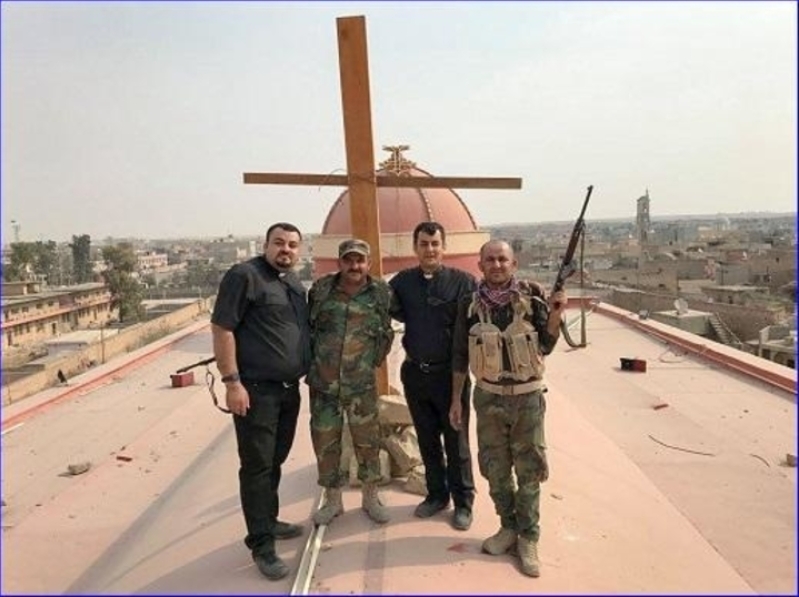
After years of suffering under the Islamic State terrorist group, Christians triumphantly returned the Cross, the symbol of Christ's victory over evil, to villages in Iraq's Nineveh Plain.
As Iraqi and Kurdish security forces continue to clear formerly held ISIS territory, Christian leaders are slowly trickling back to their homelands - including Father Thabet, who brought a cross, the size of a man, covered with flowers, with him when he returned to his home village of Karamles.
Upon arriving home, he discovered his church had been heavily damaged by ISIS, and its cross thrown to the ground. Undeterred, the priest climbed Barbara Hill, next to his village, and planted the cross firmly in the ground overlooking his hometown.
"I am so happy I can do this. I'm smiling from cheek to cheek and I weep tears of joy at the same time. This is the trip I have been praying for, for two years now," he said, according to World Watch Monitor.
"My dream is to bring all the Christians back to this village. Then we will worship outside on Barbara Hill; we will have the Eucharist in the open air. Everybody will see that this is the Church; this is the Body of Christ; this is Christian land. That is my dream - to give a testimony to the world," he said.
Meanwhile, in the village of Qaraqosh, formerly home to 50,000 Christians, Father Ammar reinstated the cross on his church, helped by Christian soldiers guarding the village after it had been liberated.
"After being away for exactly 811 days, after being attacked by the forces of darkness and evil, we have come back to worship in freedom," he said, and shared he was able to locate 40 ancient documents from his church's history, untouched by IS.
"I brought those back to our people in Erbil. For us those documents are our link with our history and are therefore very important," he said.
Iraqi regular troops and special forces, Shi'ite militias, Kurdish peshmerga fighters and other groups backed by U.S.-led airstrikes launched a campaign two weeks ago to retake Mosul, Iraq's second largest city and ISIS' stronghold. The militants overtook the predominantly Christian city and those surrounding it two years ago, giving Christians and other religious minorities three choices: pay a tax, convert to Islam, or die.
During their occupation of the city, ISIS militants looted Christian homes and desecrated churches, even turning them into their training camps. Propaganda photos released by the group showed militants vandalizing monasteries and churches, smashing statues and replacing the cross with their black flag of terror.
Reuters notes that winning back Mosul would effectively "mark the defeat of the Iraqi half of a cross border caliphate which [Islamic State leader Abu Bakr al-Baghdadi] declared from the pulpit of a Mosul mosque two years ago." Islamic State also holds large parts of neighboring Syria.
However, WWM notes it will be some time before the majority of Christian families can return to their villages close to Mosul, as they will wait for the city itself to be liberated and ISIS driven out completely.
Meanwhile, on Thursday, al-Baghdadi told his followers there could be no retreat in a "total war" against the forces arrayed against them, and expressed confidence that his Islamic State fighters would prevail against Shi'ite Islam, Western "crusaders" and the Sunni "apostate" countries of Turkey and Saudi Arabia, Baghdadi called on the jihadists fighting in the city of Mosul to "wreak havoc".
"This raging battle and total war, and the great jihad that the state of Islam is fighting today only increases our firm belief, God willing, and our conviction that all this is a prelude to victory," he said.






